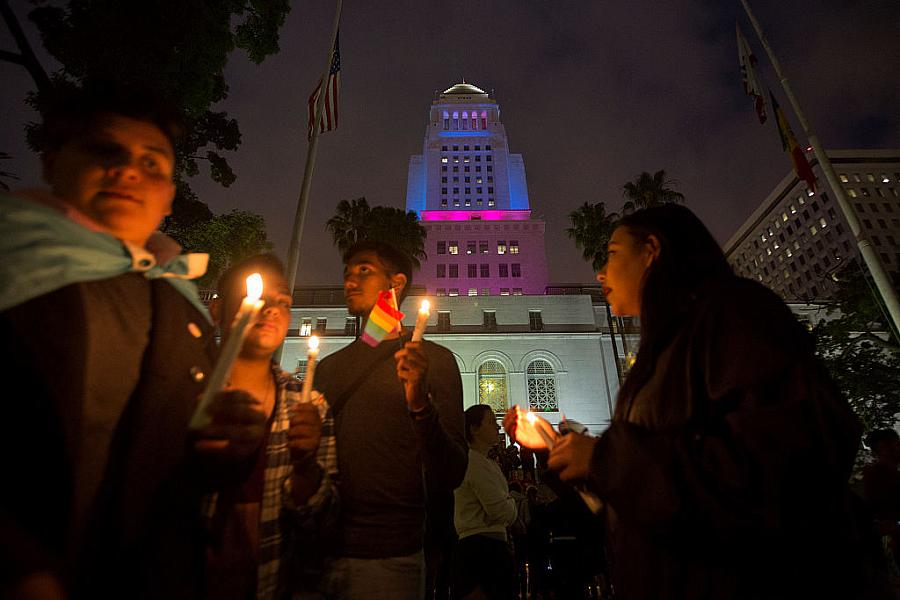Hate crimes in California against LGBTQ people are on the rise. Should it be a public health emergency?

Photo by David McNew/Getty Images
Last year in Los Angeles County, the number of overall hate crimes reported reached its highest rate in almost two decades, and the state’s LGBTQ population is one of the groups facing the highest increase in violence because of their identities.
My Center for Health Journalism 2023 Data Fellowship project in partnership with the Advocate will examine how this trend in hate crimes is affecting public health. The analysis will go back multiple years to better gauge the risks faced by some of the state’s most vulnerable groups.
Beyond identifying the hate crime risks for LGBTQ people in California, a critical component of this story will be to identify how best to care for the vulnerable populations who are experiencing this violence.
Unfortunately, there’s no time like the present to investigate this issue. So far this year, there have been 17 anti-trans hate crimes reported in Los Angeles, compared to a total of 19 in all of 2022. Those numbers indicate 2023 is on par to be the deadliest year in LA for trans people yet.
It’s important to not to just address it as a crime issue, but to ask whether this trend should be considered a public safety emergency. Hate crimes don’t just negatively affect a person’s physical body, they ravage their emotional and psychological health as well, and oftentimes the victims of the violence are already experiencing mental health challenges. Is it worth the government devoting extra support to these victims if the rate of biased crimes against them is undergoing a historic rise?
Additional questions my coverage will seek to address include how public policy can address this issue, and what victims’ access to care in the aftermath of hate violence is statewide. I’ll also look at the role of law enforcement — how are police trained to handle hate crimes and have there been any recent directives to change how they investigate and prosecute the perpetrators while also respecting the victims?
Another question worth examining: Is the plight of LGBTQ people on the streets markedly worse than previous decades? It is entirely possible that there are more reported crimes than in the past, inflating the statistics. That’s one of the questions that this 2023 Data Fellowship series will seek to answer.
Also, it’s worth considering if California is unique when it comes to the apparent rise of anti-LGBTQ hate crimes. According to the Federal Bureau of Investigation, there have been around 1,200 cases of anti-transgender hate crimes recorded in the last 10 years, which seems both high and low when you consider that California recorded 59 anti-trans bias incidents last year alone.
Because hate crimes don’t just affect transgender people, this reporting will put the number of anti-trans hate crimes in California in context with other minorities experiencing rising violence, including the non-transgender queer community and LGBTQ people of color.
Compared to prior years, there are now more discussions of transgender individuals in the media, but for a much different reason: To date more than 574 anti-trans bills have been proposed in state legislatures and 83 have passed this year. Another angle this reporting will ask if these bills motivate further anti-transgender bias, and if it’s possible to distinguish a direct link between them. This will be identified in part by engaging with the local communities that are most threatened by this violence.
The upward trend in reported violence against transgender and LGBQ people is not just happening in LA. In a 2022 survey commissioned by California Attorney General Rob Bonta, reported that hate crimes against trans citizens more than doubled year-over-year. Hate violence motivated by sexual orientation also went up nearly 30%.
Los Angeles County District Attorney George Gascón said he’s “disappointed by the most recent statistics that show we are going in the opposite direction of being inclusive,” and added that his office is “committed to prosecuting those types of crimes” with vigor.
One of the most difficult challenges this project will seek to overcome is the lack of standardized reporting procedures going back years. This project will involve requisitioning data sets from multiple state and federal sources in order to present a more complete picture of how California’s hate crimes compare to the rest of the country. Is this state more or less safe for LGBTQ people than other states across the country? It’s a tough question to answer, but essential to find out.

